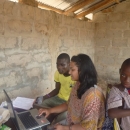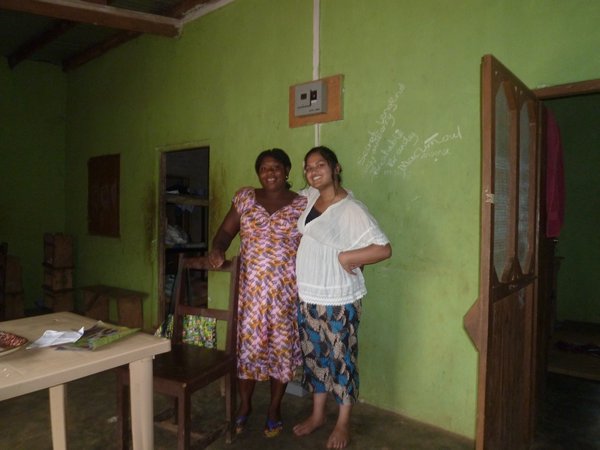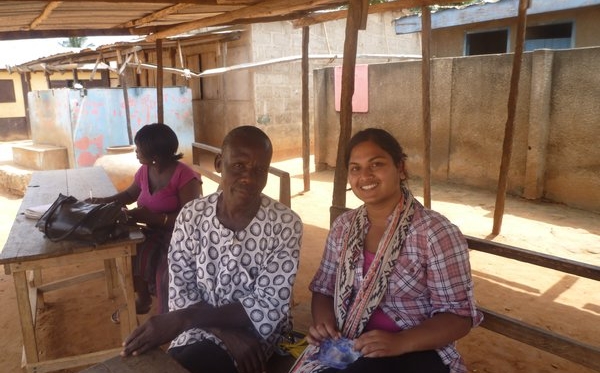And so it begins!

Sonia (CIPFA)
Friends Foundation, Ghana
Saturday, 30th June 2012 Friends Foundation, Ghana
… And so it begins.
As I stepped from the plane at Kotoka airport in Accra, I remembered the guidebook’s most encouraging phrase, “Ghana – Africa’s friendliest nation’. With that in mind, I smiled at everyone as I walked, no skipped, through the tunnel, completely unprepared to meet the barricade of officials on the other side yelling in my face, “Yellow Fever! Yellow Fever!” I’d only been in the country for 5 minutes so I was sure I didn’t have it. No, they were after my Yellow Fever certificate. I hurriedly produced it but noticed one lady was counting a wad of notes which she surreptitiously tried to pass to one of the officials only to be told, very succinctly, ‘”I’ll deal with you later” – whether that meant the official had already started to imagine what shoes she’d buy with the cash or if there was a nurse at the back with an evil grin and a massive syringe, I’ll never know. I didn’t wait to find out. Instead, I went to join the slowest immigration queue in visa-checking history (note, this was just my queue, no one else’s), before finally stepping into real Ghana!
I was greeted by David Kporfor, the founder of the Friend’s Foundation and with whom I will be working with for the next 4 weeks. We took a taxi to the market as I needed a few things, and David needed to buy 26 mattresses, as one does. We left my gigantic back pack with a man at the tro-tro stop. The tro-tro stop was in the market with people milling around from all sides. The man tied it with some rope to a post and assured me no one would take it – I looked at the man, then I looked at David who just nodded. I had no choice but to believe them or else risk walking like a stooped hermit for the rest of my days. So I left the backpack and off we went.
The first thing I noticed about the market was the sheer number of people coming, going, left, right, slow, fast. David was weaving and dipping in and out between people with me tripping and bumping along trying unsuccessfully to keep up. The second thing I noticed was the music. Every corner we turned I heard a new sound – whether it was American hip-hop, Ghanaian Hip Life, gospel – there was always something, and there was always someone tapping their feet or singing to the tune.

After we had placed our order at the mattress shop and eaten lunch at one of the stalls (rice and beans for me), we tried to find a bank to convert some currency. However, being a Saturday, the banks were shut…. What to do? Go to a man who can, of course! David asked the guy at the mattress store if he knew where I can change my money. Of course, the guy knew – he took us down some market alleys. As before, David and the guide were walking way ahead with me struggling to catch up. Suddenly I notice a group of men gathering around David shouting around him and one in particular poking him. It looked like David had accidently bumped into the man but David insisted he hadn’t. There was a lot of shouting, and then after a minute or so the men dispersed, but it was a bit of a scene. Fortunately, we were already at the space where the mattress guy’s ‘man who can’ was. He greeted us and led us to his ‘office’. As dubious as it all was, the man offered me an exchange rate which was quite favourable – I looked at the mattress guy, then looked at David who just nodded. And so I became a Ghanaian ‘millionaire’ – well in peshawas at least – their equivalent of pennies, but the denomination by which they often state values. And then off we went again….
We got to the tro-tro stop and as promised, my bag was still there. As we loaded the tro-tro the guy who’d looked after my bag started chatting with me. Within about 2 minutes I had a marriage proposal and a promise he’d come to Agbozume to visit me – Lucky me!
So, two fights and a marriage proposal later, I was finally on the three hour drive to Klikor-Agbozume. The place I will call home for the next four weeks.
July 17th 2012
Second week in and I am more settled. I’ve stopped waving at people and shouting back ‘yavu’, which apparently is not Ewe for ‘yoohoo’ as I thought, but actually means ‘white person’… whenever the ‘foreigners’ walk down the street people wave and shout ‘yavu’, so I just thought it meant ‘hello’ and would wave back shouting the same….yup, feel pretty stupid.
I’ve learnt that ‘I’m coming’ can mean ‘I’m thinking', or ‘just a moment’, or depending on who you are talking to might also mean ‘just a moment, but in half an hour’, or in Peace’s case it means ‘hold on a second because I’m just about to do a drop squat and pee right in front of you’ (Peace is about 6 years old, so it’s only just excusable).
I’ve also learnt that when David asks me to flash him, it means he wants me to give him a missed call.
I’m now a regular on the back of the motorcycles (moto) which are like taxis here, you just hop on one especially if the roads are muddy - they’re quick and pretty cheap and it’s a bit of a thrill. I have stopped holding the driver around the waist as I realised no one else was getting that intimate with their drivers (I honestly thought that’s how you’re meant to do it!) – The proper way is to just not hold on or hold the back of the moto.
This week we started the crux of the work on the finances. Operation Bank Reconciliation fell at the first hurdle – we don’t have any bank statements and haven’t found the password to look at them online. Nevermind, there’s plenty to do as Princess and I work on the income cash flow analysis and budget for the primary school, and Davidson and I work on the salaries budget for next year. Working here, I still find it surprising that an organisation has been able to survive without ever truly understanding its finances. When I ask if the budget for salaries looks about right, the response is they’ve never looked at it in that way. They just look at if they can pay it that month or not. Never at the bigger picture or any analysis of it. They normally find the money somewhere – often donations from one of their international volunteers who’ve spent time here in the past.
The lack of monitoring, analysis and planning is difficult for me to deal with sometimes and it can get frustrating. However, talking to David I have to remember to put it into context. David is around 60years old now. He started life as a farmer. As he says he was a ‘man from the bush’. If you see rural Ghana, even now, there are mud huts, no electricity, public hole in the ground toilets, little schooling, little entertainment, limited food types, they are remote and life can be incredibly tough. So if I try to imagine 50 years ago, when David would have started working in the fields, I cannot but be moved by his conviction for his calling and in realising the tangible fruits of it. He has set up a children’s home, 3 schools, farms, and has inspired people in countries over the world to believe in his cause, over the last 30 years. David himself is a strongly believing Christian, and at 30 years old, after attending a school set up by missionaries, he was driven by a sense of purpose and zeal to fix some of the ills he saw. Without any formal training or education he learnt by doing and using every opportunity to draw on expertise where he can. But one thing he is only starting to appreciate is the importance of planning. It seems the norm is to jump into things without thinking if it is really beneficial, feasible and affordable or of any timescales, and then dealing with the consequences as they arise. David explained that’s one reason why there are so many unfinished building projects wherever you go – people start something, run out of money, and then the shell just lays there until some money comes in again. In this way a simple building may take double, triple the time it normally should. In the same way, that has been the approach of the organisation, but it’s only now that the children at the children’s home are getting older and their school expenses are increasing that it is clear that (in the jargon) a medium-term financial strategy needs to be in place so David can feel more secure that his vision and legacy will continue well beyond him.
Well, let’s see where week 3 takes us…
Read Blog


